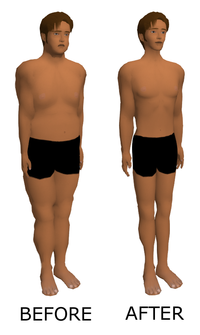
Photo from wikipedia
Abstract Objectives To evaluate the effectiveness of weight‐loss interventions on emotional eating among adults with high body mass index (BMI). Methods A systematic review, meta‐analysis and meta‐regression were performed on… Click to show full abstract
Abstract Objectives To evaluate the effectiveness of weight‐loss interventions on emotional eating among adults with high body mass index (BMI). Methods A systematic review, meta‐analysis and meta‐regression were performed on randomized controlled trials published from inception until 19 March 2021. Results Thirty‐one studies were included, representing 1203 participants with mean ages ranging from 21.8 to 57.3 years old and BMI 27.2–43.5 kg/m2. We found small‐to‐medium interventional effects on emotional eating (n = 18; Hedges' g = 0.22; p = 0.01, I 2 = 61.7%), uncontrolled eating (n = 16; Hedges' g = 0.46; p < 0.001, I 2 = 71.6%) and cognitive restraint (n = 18; Hedges' g = 0.42; p < 0.001, I 2 = 75.8%). Small‐to‐medium interventional effects were only found for emotional eating (n = 8; Hedges' g = 0.45; p = 0.02, I 2 = 74.3%) 3‐month post‐intervention, and on BMI (n = 4; Hedges' g = 0.43; p < 0.05, I 2 = 33.4%) and weight (n = 6; Hedges' g = 0.36; p < 0.01, I 2 < 10.4%) 12‐month post‐intervention. Age, male proportion, baseline BMI, attrition rate and intervention length were not significant moderators of the heterogeneity between studies. Conclusion Interventions improved emotional eating and weight loss along a year‐long trajectory.
Journal Title: European Eating Disorders Review
Year Published: 2022
Link to full text (if available)
Share on Social Media: Sign Up to like & get
recommendations!